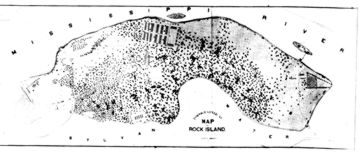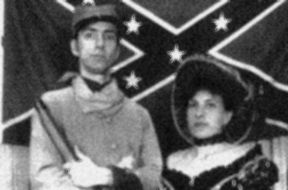Shot While Trying to Escape:
Confederate Ghosts in Davenport
Scott: There is a large house on Brady Street in Davenport which is the site of some very strange occurrences. Several times a month the residents of the house awake to hear the sounds of hounds baying and muskets being fired. The front door of the house opens and slams shut and a terrible moan is heard. There is a terrific din in the basement of the house, and more shots fired, then an eerie calm.
"Oh, we're pretty much used to it now," reports Daman Young, owner of the property. "We got a good deal on the place because they said it was haunted. Me and Jill, we didn't really believe that stuff, but it's true."
"I didn't like it, at the start. I mean, I always felt like I was being watched, and the noise at night, I would hear the gun shots and call the police, but after a while, they figured I was a kook and they stopped responding. I hope we don't really get robbed!" Jill, Daman's wife added.
The Young family had placed a call to our offices after being referred by the International Ghost Hunters Society. I was assigned the case. The family were not afraid of the ghost, and indeed, had come to feel a kind of bond with the presence. In the early stages of their haunting, the ghost would be felt as a cold presence in the room. Sometimes a partial apparition in a gray misty form could be seen walking through the room, but if directly looked at, the ghost would vanish.
Small objects would go missing around the house and turn up in unlikely areas, especially on a shelf in the basement, near the southern wall.
"It got so I just started going to the basement every morning to get my car keys. It didn't matter where I left them, that's where they would be in the morning." Daman said.
"He seems to have a fondness for family photographs, too. We often find our children's pictures down there, and sometimes their toys. The kids say they've seen a man come and watch them while they sleep at night. They aren't scared. They call him Uncle Timmy. They say he's even tucked them in. He's very respectful, though, I can honestly say I've never felt his presence when I'm in the shower or bathroom." Jill told me.
I was intrigued, to say the least. I asked them if they had looked into the history of the house, and they said no. They didn't want to get involved, and as long as things didn't get out of hand, they didn't mind the uninvited guest.
"He was here first, and he doesn't mind us living here," is all Daman would say.
I, however, wanted to know more. I checked and there had been less pleasant encounters with the ghost of that house. Past residents, including one family of color, had had great difficulty. A family of African Americans who had the family name of Cowherd was driven to near ruin by the ghost who would not allow them to sleep, constantly turned anything not secured upside down, and mismatched the medications in their bottles. Another previous tenant who had extreme difficulty was Andrew Wyatt, a dentist who every summer spent a month with a company of Civil War Re-enactors as a member of the 4th Iowa Mounted Rifles. Wyatt's uniforms were impossible to keep in good repair, constantly having buttons stolen while still hanging in the closet. His weapons would turn up missing and then appear against the south basement wall. He reported hearing a nasal voice croak the words to "Dixie", "Battle Cry of Freedom", and "Jine the Cavalry" at all hours of the night. The haunting of Wyatt led to his eventual mental collapse and attempted suicide.

Rock Island Civil War POW Camp. Prisoner's Barracks located in the upper left.
Historical records of the prison indicate that conditions were harsh in the extreme, inadequate housing with poor heating, poor provisions, and violent treatment being the rule of the day. Disease was rampant in the prison. With no hospital having been constructed, smallpox, dysentery, and pneumonia claimed 101 lives that December, 231 in January, and 350 more in February. After only eight months, confederate deaths at the camp numbered 1,300.
There were many attempted escapes from this Federal Hell Hole, though most ended in recapture or tragedy. The island itself is rife with the walking spirits of those poor men. I consulted the records and cross referenced Wyatt, the 4th Iowa Mounted Rifles, and Cowherd. I had interesting results immediately.
The 4th Iowa Mounted Rifles were one of a succession of regiments of troops which had been used to guard the Prisoners at Rock Island. These men quickly got the reputation of being quick to shoot at prisoners and regularly fired into the barracks at night. According to one prisoner's account, a J.W. Minnich, "Their firing into the barracks during the night became a matter of such common occurrence that men in the outer rows next to the dead line feared to sleep on the upper and middle bunks, and slept on the floor for safety." The ghost of a former inmate might certainly take exception to being housed with the uniform of such a guard! It is no small wonder that those missing weapons were not discharged at the sleeping reenactor himself in retribution!
As to Cowherd, it seems there is reason to believe the man was descended from a private Peter Cowherd of C. Company, 108th US Colored Infantry. This soldier was accused, though acquitted, of shooting John P. McClanahan, a prisoner of war who attempted to escape under the north wall of the prison. McClanahan, of Company D, 9th Tennessee Infantry had owned Cowherd as a slave prior to the war. Reportedly, McClanahan had given Cowherd some silver dollars to facilitate his escape. McClanahan's remains occupy grave number 1584 in the cemetery on the Island.
One of those most angry over the conditions at the camp, and upset by the "murder" of prisoners by black guards was Pvt. T.W. Grantham of the 10th Confederate Cavalry.
Grantham attempted escape many times. He tried tunneling out, attempted a dash across the partially frozen river one winter's night, and finally was able to manufacture a Federal soldier's uniform from a stolen cap and blouse, and pants tailored from the stolen coat of the post sutler. He finished his disguise by fabricating a pistol from a thick piece of pine board and walked boldly out the front gate. He made it to the Davenport side and was discovered. The local authorities gave chase with dogs and Grantham was mortally wounded in the thigh by a bullet from behind. Before his death, he managed to enter the house on Brady street and found his way into the basement, leaving a trail of blood. Both dogs and soldiers had no trouble finding him, but he was clearly beyond help. Standing around him the Federals heard his dying words:

Pvt. T. W. Grantham and his wife, 1862.
Colonel Johnson, Commandant of the Rock Island Prisoner of War Camp was mustered out of the Army against his wishes in 1866 and moved back to Newark New Jersey. There he died soon after with a brain destroyed by paresis.
SOURCES:
A Short History of the Rock Island Prison Barracks, Otis Bryan England of the Historical Office at US Army Armament, Munitions, and Chemical Command, Rock Island, IL 61299-6000
The War of the Rebellion: A Compilation of the Official Records of the Union and Confederate Armies
and
Inside of Rock Island Prison from December 1863 to June 1865, JW Minnich, Publishing House of ME Church, 1908
Back to this Issue Contents
